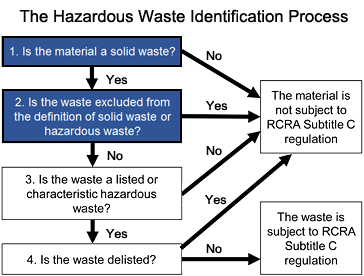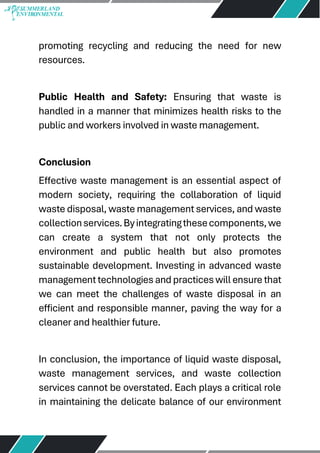Not known Factual Statements About Reclaim Waste
Not known Factual Statements About Reclaim Waste
Blog Article
7 Simple Techniques For Reclaim Waste
Table of ContentsReclaim Waste Fundamentals ExplainedThe Basic Principles Of Reclaim Waste How Reclaim Waste can Save You Time, Stress, and Money.About Reclaim WasteFacts About Reclaim Waste Uncovered
Discover the kinds, occurrences, and types of fluid waste. Domestic sewage waste refers to the waste and items from a residential sewage-disposal tank. This sort of waste is produced by human beings in houses, institutions, and various other buildings. This only consists of septic containers that have a drain area. The correct monitoring and disposal of residential sewage waste require liquid waste to be moved to a sewer therapy plant where the proper methods and tools are used to purify and take care of waste.
Business waste often consists of potential dangers, such as combustible materials or a mix of liquid and solid waste items, and calls for an advanced and in-depth disposal process. The disposal of industrial waste commonly entails the filtering of waste before transportation to ensure secure and correct disposal. Hazardous waste is created from results and runoff of commercial procedures and production.
This type of waste can not use the same sewage management transport or processes as septic or business liquids. The hazardous waste management procedure needs the examination and testing of fluid waste before it undertakes the disposal procedure (liquid waste disposal). Runoff waste is the fluid waste that comes from drainage and excess stormwater in very inhabited locations or cities
Drainage waste can create contamination and flooding if not taken care of correctly. Discover more concerning drain cleaning and waste monitoring. Making sure appropriate waste monitoring can stop disasters and decrease ecological damage. Both people in residential setups and professionals in commercial or production markets can gain from comprehending the procedures and policies of fluid waste monitoring.
Reclaim Waste Can Be Fun For Everyone
Get in touch with PROS Solutions today to learn more about our waste administration and disposal solutions and the appropriate ways to care for the fluid waste you generate.
(https://issuu.com/reclaimwaste1)Do you recognize what happens to your water when you end, purge the toilet or drain pipes the cleaning device? No? Well, it's worth understanding. This supposed 'wastewater' is not only a crucial resource however, after therapy, will certainly be launched to our land, waterways or the ocean. Utilized water from bathrooms, showers, baths, kitchen area sinks, laundries and industrial processes is understood as wastewater.

water made use of to cool down machinery or clean plant and tools). Stormwater, a form of wastewater, is drainage that flows from agricultural and metropolitan locations such as roofing systems, parks, gardens, roads, courses and gutters right into stormwater drains pipes, after rainfall. Stormwater streams unattended straight to regional creeks or rivers, at some point reaching the ocean.
The 9-Second Trick For Reclaim Waste
In Queensland, a lot of wastewater is dealt with at sewer treatment plants. Wastewater is transported from residential or industrial sites via a system of sewage systems and pump terminals, recognized as sewage reticulation, to a sewage therapy plant.
The Division of Natural Resources recommends city governments concerning handling, operating and maintaining sewerage systems and therapy plants. In unsewered locations, neighborhood governments might call for homeowners to set up specific or home sewage treatment systems to treat residential wastewater from commodes, kitchen areas, bathrooms and laundries. The Division of Natural Resources authorizes using house systems when they are shown to be reliable.
The majority of stormwater obtains no therapy. In some new class, therapy of some stormwater to remove trash, sand and crushed rock has actually begun using gross contaminant traps. Wastewater treatment takes place in four phases: Eliminates strong issue. Bigger solids, such as plastics and various other objects wrongly released to sewage systems, are removed when wastewater is passed with displays.
Wastewater then streams right into huge tanks where solids settle and are removed as sludge. Oil and residue are skimmed from the surface area. Uses tiny living organisms called micro-organisms to damage down and eliminate remaining dissolved wastes and fine fragments. Micro-organisms and wastes are integrated in the sludge. Gets rid of nitrogen and phosphorus nutrients that could trigger algal blossoms in our rivers and intimidate aquatic life.
Some Known Facts About Reclaim Waste.
Nutrient elimination is not available at all sewage therapy plants because it needs expensive specialist equipment. Clear liquid effluent created after treatment might still include disease-causing micro-organisms - liquid waste removal.

This usually means wastewater has to be treated or impurities gotten rid of prior to it can be released to waterways. Many wastewater moves right into Go Here the sewage system. Under the Act, city governments administer authorizations and licences for ecologically appropriate tasks (Periods) including wastewater releases that might have a local influence. The division carries out approvals and permits to ERAs including wastewater launches that might have a regional or statewide influence.
What Does Reclaim Waste Do?
Or else, samples are taken for research laboratory evaluation. Often lots of examinations are required to develop the levels of each of the different pollutants such as oils, hefty steels and pesticides in water. Monitoring supplies accurate info regarding water high quality and can verify that permit problems are being satisfied. The info acquired with monitoring offers the basis for making water quality choices.
Report this page